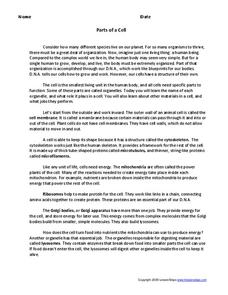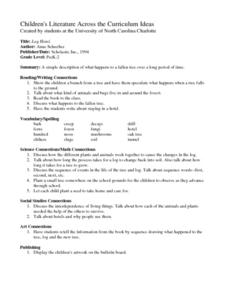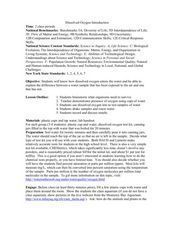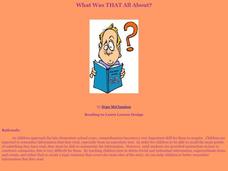Curated OER
Parts of a Cell
Simplify the parts of a cell with this handout and brief activity. Learners read a two-page explanation of the parts of a cell that includes bolded vocabulary words. Using what they have just read, class members answer 19...
Curated OER
The good microbes
The question posed for the class to consider; What would decay and what would not? They read the short passage on decomposition and microbes, then mark the items that would decay after a two-week period. A scientific investigation idea...
Curated OER
All About Seeds!
First graders learn all about seeds. For this biology lesson, 1st graders discover: what a fruit is, what is inside of seeds, and how seeds are transported.
Curated OER
The Wonderful World of Slugs
Examine a slug? Of course, what else would a 2nd grader do with it? Pupils use clues and go on a slug hunt, read a slug story, or make a cooperative group mural of a slug's habitat. While older learners catalog slugs, go on a slug hunt,...
Wild BC
Carbon - The Short and the Long
For this complex game about the carbon cycle, the playing field is divided into air, living, and earth zones. Children are assigned to be either plants or animals, and collect carbon tokens as they proceed from zone to zone. While the...
Science Matters
Island Fox Outreach
Off the coast of California lives a wild animal called the Island Fox. Experts discuss the importance of the Island Fox to the Channel Islands and the balance the fox creates within its ecosystem. The lesson concludes with a reading of...
Curated OER
Log Hotel
Learners identify how the different plants and animals work together to cause the changes in the log. Students discuss the sequence of events in the life of the tree and log. Learners plant a seed to take home and care for. Students...
Curated OER
Interpreting Data from Birdfeeders
What kinds of birds live in your area? Read a book about birds to your learners and explore their feeding patterns. Charts and graphs are provided in this three page packet, but consider assigning the basic questions if using with young...
Curated OER
Biosphere
There is so much to learn about the different cycles, processes, and parts of the biosphere. Using a pretest as a formative assessment to see what your budding ecologists already know is a great way to figure out which important areas...
Curated OER
Dissolved Oxygen Introduction
Students are shown how dissolved oxygen enters the water. They are taught the difference between a water sample that has been exposed to the air and one that has not. Students brainstorm what organisms need to survive. They use dissolved...
Curated OER
Everyone Has Rules
Young scholars develop awareness of the necessity for rules and use logic to decide what rules make the classroom have a learning and caring atmosphere. They examine the choices they make have consequences.
Curated OER
F.B.I.
Learners create a worm bin full of fruit and vegetable scraps wit paper and observe what happens over time. In this decomposers lesson plan, students observe that the fruit and vegetable scraps become new soil.
Lycoming College
An Author Study of Jan Brett
Jan Brett, the author of many beloved children's books, is well worth a study. Try out this winter-themed unit, which covers areas of language arts as well as art, math, science, and social studies.
Zebrafish in the Classroom
Worksheet on Genetics for Kindergarteners
Introduce the concept of genetics to your kindergartners with a science experiment about chromosomes in fish. After a quick overview of what chromosomes are, learners color different chromosomes to show that they come from the mom or the...
Oregon Museum of Science and Industry (OMSI)
DNA Extraction
What does your DNA actually look like? Use simple materials with this experiment to find out! Geneticists of all ages can follow these instructions to extract their own DNA. For learners who are hoping to extend the activity, there are...
Curated OER
The Way Things Work
Students explore how things are designed, built and function. Students interpret the film The Swiss Family Robinson. Students discuss and analyze medieval technology and the amazing craftsmen and stoneworkers it took to build such...
Curated OER
What Is Technology?
Second graders engage in a literature study that is concerned with transmitting new knowledge about modern technology. They identify different forms of technology and how it is used in everyday society. The lesson plan includes...
Curated OER
What Was It Like To Live in Tudor Times?
Students compare and contrast the lives of the rich and poor people in Tudor times. Students observe photographs of Tudor life. They investigate word clues describing the lives of the people. Students create a presentation on their...
Curated OER
What is an Animal Group?
Students discover that people live in groups and animals live in groups or alone. They list ways that families cooperate and work together as a group. They create a large dinosaur made out of geometric shapes.
Curated OER
Resources - Can't live without them!
Students review concepts and ideas previously explored. They are reminded of what resources are, the types of resources which exist, and what role they can potentially have in international affairs.
Curated OER
What Was THAT All About?
Second graders review silent reading techniques as the teacher models them. They discover the meaning of summarizing what they have read including the three step method and read Snake Safari. They then create a summary map together to...
Curated OER
Where People Live- Neighborhoods
Students use a map. In this neighborhood lesson, students describe a neighborhood, emphasizing the common characteristics between all neighborhoods. Students locate a neighborhood on a landscape picture map and discuss.
Curated OER
From Eggs to Frogs
Third graders receive a small container of tapioca pudding, they are to pretend that it is frog eggs. The students pretend they are birds who see the eggs, and eat some of them. They discuss what would happen if these were really frog...
ARKive
Adaptations to Arid Habitats
How do plants and animals survive in habitats with very little water? Explore arid ecosystems and the way their inhabitants have adapted with a lesson and science experiment. After kids listen to a presentation about adaptation, they...

























